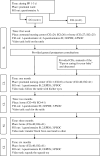Mother-infant interaction quality and sense of parenting competence at six months postpartum for first-time mothers in Taiwan: a multiple time series design
- PMID: 30189849
- PMCID: PMC6127995
- DOI: 10.1186/s12884-018-1979-7
Mother-infant interaction quality and sense of parenting competence at six months postpartum for first-time mothers in Taiwan: a multiple time series design
Abstract
Background: For first-time mothers, not knowing how to interact with newborn infants increases anxiety and decreases the quality of the parent-infant interactions. A substantial lack of interactional knowledge can ultimately limit the adjustments necessary for a stable transition into motherhood. This study investigated how postpartum parenting education influenced first-time mothers' mother-infant interaction quality and parenting sense of competence.
Methods: Eighty-one healthy first-time-mother and infant dyads were recruited. The control group (n = 40) received postpartum care based on the medical and cultural norms practiced in Taiwan, while the experimental group (n = 41) received, on top of typical care, education by way of a 40-min videotape on infant states, behaviors, and communication cues, as well as a handout on play practices. Data were collected at five points: within the first week, and during follow-ups in the first, second, third, and sixth months after birth. We administered the Chinese versions of the Parenting Sense of Competence Scale and Edinburgh Perinatal Depression Scale, and used the Nursing Child Assessment Teaching Scale to score videotaped mother-infant interactions.
Results: We observed an increase in the quality of mother-infant interaction within the experimental group only. Furthermore, at the five assessment points, we observed no significant changes in perceived parenting competence. Among all subjects, there were correlations between postpartum depression scores, parenting competency, and quality of mother-infant interaction.
Conclusions: Our results indicate that first-time mothers in Taiwan who are provided with extra education on infants' abilities and how to effectively play with infants are likely to exhibit improvements in quality of interaction.
Keywords: First-time mothers; Parenting education; Parenting sense of competence; Parent–infant interaction quality.
Conflict of interest statement
Ethics approval and consent to participate
This study received institutional review board (IRB) approval (no. 99-0243B) of Chang Gung Memorial Hospital, Taiwan. All participants signed an informed consent form.
Consent for publication
Not applicable.
Competing interests
The authors declare that they have no competing interests.
Publisher’s Note
Springer Nature remains neutral with regard to jurisdictional claims in published maps and institutional affiliations.
Figures



Similar articles
-
Effects of maternal confidence and competence on maternal parenting stress in newborn care.J Adv Nurs. 2012 Apr;68(4):908-18. doi: 10.1111/j.1365-2648.2011.05796.x. Epub 2011 Jul 27. J Adv Nurs. 2012. PMID: 21790741
-
Psychopathology and parenting: An examination of perceived and observed parenting in mothers with depression and PTSD.J Affect Disord. 2017 Jan 1;207:242-250. doi: 10.1016/j.jad.2016.08.035. Epub 2016 Oct 3. J Affect Disord. 2017. PMID: 27732922 Free PMC article.
-
Maternal psychological distress after preterm birth: Disruptive or adaptive?Infant Behav Dev. 2017 Nov;49:272-280. doi: 10.1016/j.infbeh.2017.09.012. Epub 2017 Nov 2. Infant Behav Dev. 2017. PMID: 29073522
-
Postpartum depression: Etiology, treatment and consequences for maternal care.Horm Behav. 2016 Jan;77:153-66. doi: 10.1016/j.yhbeh.2015.08.008. Epub 2015 Aug 28. Horm Behav. 2016. PMID: 26319224 Review.
-
The maternal brain and its plasticity in humans.Horm Behav. 2016 Jan;77:113-23. doi: 10.1016/j.yhbeh.2015.08.001. Epub 2015 Aug 9. Horm Behav. 2016. PMID: 26268151 Free PMC article. Review.
Cited by
-
Effect of the Parenting Preparation Program on Maternal Role Competence: A Systematic Review and Meta-Analysis.Iran J Nurs Midwifery Res. 2023 Jul 24;28(4):384-390. doi: 10.4103/ijnmr.ijnmr_159_22. eCollection 2023 Jul-Aug. Iran J Nurs Midwifery Res. 2023. PMID: 37694197 Free PMC article. Review.
-
Exploring predictors of interaction among low-birth-weight infants and their caregivers: a machine learning-based random forest approach.BMC Pediatr. 2024 Oct 10;24(1):648. doi: 10.1186/s12887-024-05080-8. BMC Pediatr. 2024. PMID: 39390386 Free PMC article.
-
Parenting sense of competence among chinese parents of premature infants: a cross-sectional study.BMC Pregnancy Childbirth. 2023 May 30;23(1):399. doi: 10.1186/s12884-023-05703-5. BMC Pregnancy Childbirth. 2023. PMID: 37254065 Free PMC article.
-
The role of midwives in supporting the development of the mother-infant relationship: a scoping review.BMC Psychol. 2023 Mar 14;11(1):71. doi: 10.1186/s40359-023-01092-8. BMC Psychol. 2023. PMID: 36918968 Free PMC article.
-
A Community-enabled Readiness for first 1000 Days Learning Ecosystem (CRADLE) for first-time families: study protocol of a three-arm randomised controlled trial.Trials. 2021 Mar 6;22(1):191. doi: 10.1186/s13063-021-05144-5. Trials. 2021. PMID: 33676560 Free PMC article.
References
-
- Hofer MA. Psychobiological roots of early attachment. Curr Dir Psychol Sci. 2006;15(2):84–88. doi: 10.1111/j.0963-7214.2006.00412.x. - DOI
-
- Shannon JD, Tamis-LeMonda CS, London K, Cabrera N. Beyond rough and tumble: low-income fathers’ interactions and childrens’ cognitive development at 24 months. Parenting. 2002;2(2):77–104. doi: 10.1207/S15327922PAR0202_01. - DOI
-
- Negayama K, Delafield-Butt JT, Momose K, Ishijima K, Kawahara N, Lux EJ, Murphy A, Kaliarntas K. Embodied intersubjective engagement in mother–infant tactile communication: a cross-cultural study of Japanese and Scottish mother–infant behaviors during infant pick-up. Front Psychol. 2015;6:66. doi: 10.3389/fpsyg.2015.00066. - DOI - PMC - PubMed
MeSH terms
Grants and funding
LinkOut - more resources
Full Text Sources
Other Literature Sources
Medical

